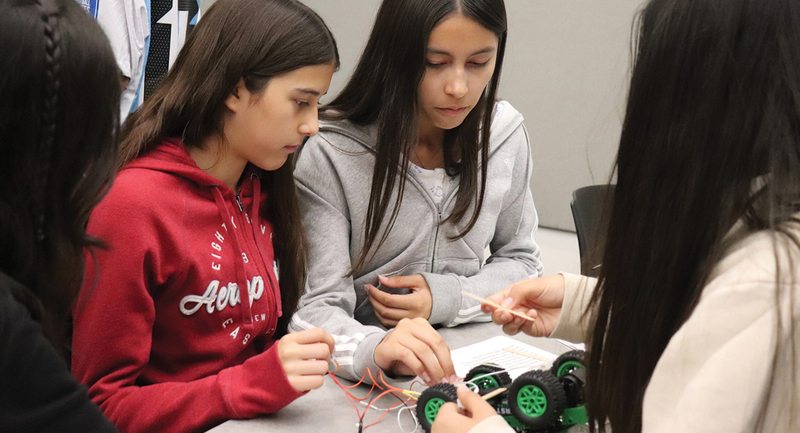March 1, 2020
•
5 min (est.)•
Vol. 77•
No. 6Confronting Inequity / Who Has the Privilege to Be Empowered?
From kindergarten through 8th grade, I prided myself on being a star student. At my Bronx parochial school, I received stellar marks and was always at the top of my class. I even graduated valedictorian in 8th grade. My good grades and behavior earned me a scholarship to attend boarding school in New England.
At my new school, I learned very quickly that my academic stardom had an expiration date. For the first time, schoolwork was difficult. At my Bronx school, being a good student, for the most part, had meant being a good memorizer and information regurgitator. My social studies papers had consisted of whole paragraphs copied from Encyclopedia Britannica. Language arts was listening to my teacher yell at my classmates and me to do the exercises in the textbook. Science meant memorizing the key points at the end of each chapter to ace the tests. Mostly, my classmates and I just sat, taking notes from the board.
At boarding school, however, my classmates and I discussed literature, historical events, and math theorems around a table. I had to analyze and critique what I had read in essays without the help of an encyclopedia. Ill-prepared, I struggled to keep up. I realized that, despite feeling confident at my old school, I was not an empowered student. I had not learned how to question authority, pick apart arguments, take advantage of available resources, ask for help, design my own path for learning, or speak up in class. Instead of being taught how to be empowered, I had learned how to follow rules and honor the opinions and ideas of those in authority at the expense of my own.
Too many young people from disadvantaged communities like the one I grew up in have similar experiences in school. Like me, they go through school as passive learners being told what to do and how to do it. They are forced to eat lunch silently, march in straight lines, fill in worksheets, copy notes from the board, and cram for standardized tests. They are expected to SLANT—sit up, lean forward, ask and answer questions, nod their heads, and track the teacher—to show engagement. In these ways, our students, predominantly youth of color, learn compliance and are deprived of opportunities to develop critical thinking and analytical skills that foster agency.
Though my boarding school provided me with the necessary tools, resources, and experiences to develop academic agency, I was not entirely empowered there, either. To survive, to grasp success, I had to learn and perform the language and culture of whiteness. Anytime my Blackness, my Bronxness, showed up in my behavior, speech, or mannerisms, my classmates would look at me skeptically as if there was something wrong with me, and my teachers would correct me. Interactions in the classroom and on campus routinely conveyed to me that I was viewed as inferior or not trustworthy. Despite the pedigree and academic preparation boarding school offered me, it was clear that I was not empowered—or safe—to be Black.
Later, as an educator, I would come to understand that the world is uniquely disempowering for Black children. Black youth are more likely to get stopped and frisked (New York Civil Liberties Union, ND). If they are in police custody, they are more likely to be mistreated (Jacobs, 2017). When Black youth laugh loudly in public, people often perceive them as grown-ups causing a scene, as they are too often adultified (Epstein, Blake, & González, 2017). And they are suspended and expelled from school at a rate three times higher than their white peers and are punished more harshly for the same infractions (Gregory, Skiba, & Noguera, 2010).
Simply, Black children do not have the privilege of being empowered, not with the way their behavior is regarded as threatening, not with the way they are devalued, not with the limited mind-sets educators sometimes have about what Black students can and cannot do. For Black youth and other students of color in a society fraught with racial bias and inequity, being truly empowered comes with a host of risks.
No instructional paradigm, pedagogical practice, or policy will empower all students if we do not dismantle the racist systems that perpetuate the reality that Black students and youth of color are more likely to do poorly in school, to live in less resourced communities, to have worse academic and life outcomes, and to have their identities erased at school. Our education system was founded on practices that once excluded Black people from attending school and from sitting in the same classrooms as white students. To overcome this history of exclusion, we must acknowledge it and then commit to eradicating not only the racist remnants, but also its present manifestations.
We can begin by engaging in the necessary and uncomfortable work of becoming equity literate and anti-racist. This means understanding how our identity, power, and privilege play out in our instruction, classroom management, and relationships, and ensuring no harm is done. It means unlearning how we have been socialized in harmful, divisive ways. It means calling out inequity and racism when we see it—every single time—and working with colleagues and students to find solutions. It means taking on a stance of inquiry about our students, their families, and communities, and seeing them as equals—not in need of saving. It means creating classroom and school climates where all community members feel safe to be who they are without ridicule or bullying, where they can express themselves freely without being silenced.
Disrupting inequity also means having conversations with and teaching students about race and other forms of oppression. Too often, we shy away from difficult conversations about difference and conflict, fearing that our students are too young and incapable to engage meaningfully. But our students are desperate to make sense of their ever-more complex worlds, and we cannot develop empowered students by hiding from them what is happening around them—the good, the bad, and the ugly. This is a lesson I had to learn for myself after my boarding school years.
If we do not equip our young people to confront inequity, they will grow up to be adults who are unable to identify racism, bias, and their complicity in oppressive structures. They will grow up without the stamina and sensitivity to engage in race conversations with families, friends, strangers, and colleagues. They will grow up without the preparation or empowerment to disrupt the cycle of oppression in which many of us are still toiling.
References
•
Epstein, R., Blake, J. J., & González, T. (2017). Girlhood interrupted: The erasure of Black girls' childhood. Georgetown University Law Center – Center on Poverty and Inequality, p. 1–19.
•
Gregory, A., Skiba, R. J., & Noguera, P. A. (2010). The achievement gap and the discipline gap: Two sides of the same coin? Educational Researcher, 39(1), 59–68.
•
Jacobs, M. S. (2017). The violent state: Black women's invisible struggle against police violence. William and Mary Journal of Race, Gender, and Social Justice, 24(1), 39–100.
•
New York Civil Liberties Union. (n.d.). Stop-and-frisk data. Retrieved from https://www.nyclu.org/en/stop-and-frisk-data








